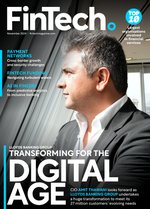Square's Head of Payments Partnerships on transaction trends

Kaushalya Somasundaram is the Executive Director and UK Head of Payments Partnerships & Industry Relations at Square.
Tell us about your role at Square and your journey in the digital payments space.
I’ve been at Square for over two years and have continuously enjoyed both the challenge and opportunities offered to me in my role as Head of Payments, Partnerships & Industry Relations, UK. I’ve been working in the wider finance industry itself for more than decade and have always been excited about the power it has to positively shape the lives of consumers and business. There’s also massive opportunities for innovation in the industry, something I continue to witness firsthand at Square where we seek to combine creativity and technology to create tools which can help businesses of every size, succeed.
There are so many changes in the digital payments space right now. How are these innovations driving/helping business and commerce?
This is an exciting time for payments, and fintech in general! At Square, we’re always looking at ways to help make the lives of business owners easier. This means really getting under the skin of those who use our products and finding out what makes them tick, as well as what their day-to-day challenges are. We’re constantly on the lookout for innovation and recently announced a new partnership with Codebase; a partnership which will enable upcoming UK entrepreneurs to make full use of Square’s ecosystem of hardware and software tools, allowing them to kick-start their business with products that anticipate their needs and help them streamline their business processes. Similarly, our latest hardware launch, the reimagined Square Stand will help business owners reduce their reliance on too many tools by combining several key pieces of tech in one set place.
How does the current situation and the past two years look set to impact the digital payment space, and how is Square responding to it?
The needs of UK consumers have evolved significantly over the last two years: consequently, so have the needs of business owners as they find themselves trying to keep up with consumer trends and protect themselves in an unpredictable economic climate, both of which have undoubtedly been very challenging.
Our Future of Retail research shows that shopping online has become popular overtime for consumers, with 97% saying they make an online purchase monthly. This is something retailers have noticed and are proceeding to react to to ensure consumers have a decent ecommerce offering at hand when wanting to interact with their business. Our data reflects this, showing that 87% of retail managers and owners have started providing an online offering in response to the challenges presented by the pandemic. Tools such as our free website builder, Square Online have been incredibly useful in helping businesses establish an official online presence which allows people to find them and easily buy their products. Many smaller businesses we work with, like homewares company Moussem, take this step after initially running their busy primarily through social media channels i.e. Instagram.
We also found that businesses continue to find it hard to cut through the noise to attract new customers and retain the ones they have, so we’ve released new products into the market like Square Loyalty and Square Marketing to help them do just this but at a click of a button. Not only do products like these make marketing content easier to understand for businesses of all sizes, it makes marketing campaigns - regardless of complexity - easier to execute.
Please outline one major trend that is having a significant impact on the digital payments space - and will continue to do so over the next few months.
This is not a new trend but rather a continuing one that has been exacerbated by the COVID-19 pandemic. Half of all payments made in the UK in 2020 were made using cards, according to UK Finance. This suggests people are actively embracing contactless payments as a way to pay for their purchases - behaviour enabled by the government’s decision to raise the contactless payment limit to £100.00 in late 2021. For businesses moving forward, this means being able to accommodate such payments is increasingly becoming a necessity, even for sites traditionally known to be cash-only, such as market stores. Not only does this benefit consumers by providing more choice, but it also helps businesses with their operations too since, compared to cash, contactless payments provide more visibility when it comes to cash flow.
What are some of the common issues you see affecting users of your products i.e business owners?
One of the most pressing issues we see affecting business owners at the moment is the rising costs that come with operating a business. Our recent research shows that those in hospitality, in particular, are feeling the pressure with many UK eateries experiencing a ‘lunchflation’ where popular lunch goods have significantly increased; for example, soups on average are up by 36% from £3.38 to £4.61. Burgers and salads have also experienced rising costs, as business owners are forced to raise the prices of their products/services to meet operation costs.
Fintech tools can form part of a number of steps business owners can take to protect themselves from economic hardship. Having tools that automate processes, for example, our invoice management software, can help streamline processes in a business and thus, increase operational efficiency. Similarly, our software Square appointments, allows customers to book appointments for a business’ services, taking care of simple administrative tasks so staff can focus on bigger tasks and interact with customers.
QR codes have experienced somewhat of a mini resurgence over the past pandemic - how exactly have they been changing how businesses operate?
QR codes at the height of the pandemic have proven to be a vital lifeline for many businesses who needed to find a way to ensure a high-quality customer experience whilst also adhering to
COVID-related government restrictions and guidelines. With codes in place, consumers were able to order food on their phone with minimal contact with business staff and surfaces (i.e. menus, bank notes etc.), this helped provide a stream of business to many stores but also helped to ease the health-related worries of consumers, many of who were cautious of shopping or going to places in person. It’s no surprise then that 39% of consumers want to see QR codes used more broadly by businesses in the future, suggesting they are being positively received by shoppers.
- NVIDIA & GFT: Innovating for Banks in Open-Source AI DealBanking
- Fintech Moneybox Climbs Tech Rankings After 1,399% SurgeFinancial Services (FinServ)
- FIS Raises Outlook After Strong Q3 Growth in Fintech RevenueFinancial Services (FinServ)
- GFT & Palo Alto Networks: Pioneering Secure Digital BankingFinancial Services (FinServ)

